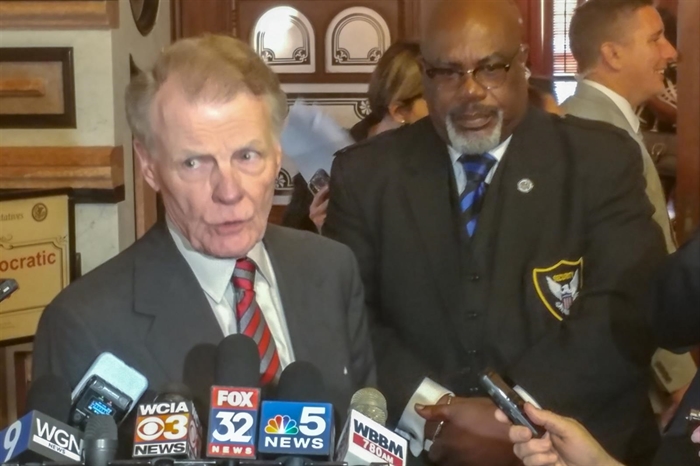‘The Madigan Enterprise’: Inside the federal indictment of the state’s former speaker

SPRINGFIELD — In a 106-page, 22-count indictment, federal prosecutors painted a picture of former House Speaker Michael Madigan as the leader, along with a longtime confidante, of a sweeping criminal enterprise that influenced legislation for personal power and financial gain.
“The Madigan Enterprise,” as prosecutors called it in the document filed Wednesday, benefitted from Madigan’s position as a Democratic ward committeeman, speaker of the Illinois House of Representatives, chairman of the Democratic Party of Illinois and law partner at Madigan & Getzendanner.
In those capacities, Madigan, either personally or through confidante Michael McClain, is accused of guiding the enterprise’s illegal activities to punish opponents and reward loyalists, all while generating money for him and other members of the criminal enterprise, according to the indictment and comments from U.S. Attorney John Lausch Jr. of the Northern District of Illinois.
The feds accused Madigan of using intermediaries, falsifying documents, meeting in-person and using third-party phones to avoid detection by federal agents, as well as speaking in coded language to protect the conspiracy.
But the former speaker still vehemently denied wrongdoing in a statement distributed by his lawyers, Sheldon Zenner and Gil Soffer of the Katten law firm.
“I was never involved in any criminal activity,” Madigan said in a statement distributed by the law firm. “The government is attempting to criminalize a routine constituent service: job recommendations. That is not illegal, and these other charges are equally unfounded.”
The statement directly contradicted claims made publicly in the indictment and by Lausch at a news conference announcing the charges Wednesday night.
Madigan and the enterprise are accused of receiving bribes and “unlawful personal financial advantage(s)” from parties that had business with the state and city of Chicago. Madigan’s power to pass or kill legislation in the General Assembly, along with his control over resources through his various positions of power, were used to entice financial rewards from third parties, according to the allegations.
In that effort, the enterprise used “threats, intimidation, and extortion to solicit benefits from private parties,” and used facilities of interstate commerce to further the goals of the enterprise, another federal crime, according to the indictment.
Madigan, 79, and McClain, 74, both face charges of racketeering, conspiracy, bribery and wire fraud. Madigan faces additional charges for attempted extortion.
While the sprawling indictment outlines wire taps and email conversations and even directly quotes the former speaker, Madigan’s lawyers said in a statement, “neither the law nor the facts support these baseless charges, and the evidence will prove it.”
“Throughout my 50 years as a public servant, I worked to address the needs of my constituents, always keeping in mind the high standards required and the trust the public placed in me,” Madigan said, according to the statement. “I adamantly deny these accusations and look back proudly on my time as an elected official, serving the people of Illinois.”
The indictment detailed several schemes attributed to the Madigan Enterprise.
The first involved Chicago-based electric company Commonwealth Edison, or ComEd. Many of those details had already been made public in a deferred prosecution agreement the company entered into in July 2020.
The indictment alleges that Madigan shepherded the passage of legislation that helped ComEd, specifically the Energy Infrastructure and Modernization Act in 2011 and the Future Energy Jobs Act in 2016. In 2018, legislation adverse to ComEd was killed, per the indictment.
In exchange for his support of legislation favorable to ComEd, the indictment stated that Madigan placed political pals into ComEd’s intern program, even though they may not have been qualified.
He also allegedly named his choice for an appointment to ComEd’s board, received “vendor” jobs for his friends on ComEd’s payroll that required little or no work, and received contracts from ComEd for his political allies.
The indictment includes forfeiture actions against McClain and Madigan for $2.8 million for proceeds they allegedly obtained, directly or indirectly, from racketeering activity.
A central player in another scheme is identified as Alderman A, who “cooperated in an undercover capacity” with the FBI. Alderman A has been identified as Danny Solis, who served as the city’s zoning committee chair on the timeline identified in the indictment.
According to the indictment, in 2018 Madigan solicited Solis to usher work toward his law firm in exchange for getting Solis a state board appointment at about $100,000 a year. Madigan said he would arrange for the appointment of Solis to the Illinois Commerce Commission or the Illinois Labor Relations Board and tried to get a state job for Solis’ relative, according to the indictment.
Such an appointment would have to come from the state’s governor, a position that, at the time, was slated to be filled by Gov. JB Pritzker within months of the alleged misconduct.
The indictment does not allege any misconduct by Pritzker, and Solis did not receive an appointment to a state board.
Pritzker, however, did meet with federal investigators as a witness in the Madigan investigation, and he was “pleased to cooperate,” according to his office. He spoke with federal investigators in a virtual meeting for more than an hour in late February, according to Pritzker’s spokesperson Jordan Abudayyeh.
Pritzker condemned Madigan in harsh terms and answered questions on the indictment Thursday morning at an unrelated news conference. He said it was not immediately clear to him at the time of the questioning that an indictment would be forthcoming, and he did not suspect any misconduct from Madigan in their interactions pertaining to state government.
“Remember, I was governor. He was speaker of the House. There was a Senate president, there were leaders across the General Assembly,” he said. “I needed to work with all of them and so none of the interactions that I had were anything other than about, you know, things to do with doing the right thing in government for the people.”
In another scheme detailed in the indictment, Madigan sought an introduction from Solis to a multi-unit apartment developer that was seeking a favorable zoning decision from Solis’ committee. Madigan was allegedly seeking business for his private law firm from the developer identified only as Company C.
The feds alleged that on June 23, 2017, Solis told Madigan, “I think they understand how this works, you know, the quid pro quo, the quid pro quo,” in reference to the apartment developer. Madigan allegedly responded, “Okay…Very good.”
On July 18, 2017, Madigan allegedly told Solis privately not to use the term “quid pro quo.”
“You’re just recommending … because if they don’t get a good result on their real estate taxes, the whole project will be in trouble… Which is not good for your ward. So you want high quality representation,” Madigan is quoted as saying in the indictment.
Then there was the parking lot in Chicago’s Chinatown neighborhood.
In 2017, a group of real estate developers, identified only as Group A in the indictment, was involved in the development of a large commercial development that would include a hotel in Chicago’s Chinatown neighborhood. But the development group needed a parking lot that was owned by the state.
Madigan agreed to use his position as speaker of the House to assist with the transfer of the Chinatown parcel, according to the indictment. In exchange, legal work would be steered to his private law firm, Madigan & Getzendanner, which would generate legal fees that personally benefitted Madigan.
When two legislators opposed the transfer of the Chinatown parcel, Madigan suggested sending a delegation from Chinatown to visit two state senators to persuade them to remove their opposition, according to the indictment.
In November, Secretary of State Jesse White’s Office received letters from business owners in Chinatown, opposing the transfer.
Madigan advised that the bill to transfer the land would not go forward during the veto session, but he would attempt to try to get it through the legislature in May 2019.
Madigan’s arraignment is scheduled for March 9.
Miss Clipping Out Stories to Save for Later?
Click the Purchase Story button below to order a print of this story. We will print it for you on matte photo paper to keep forever.

